March 27, 2019
A To the Lighthouse Memoir
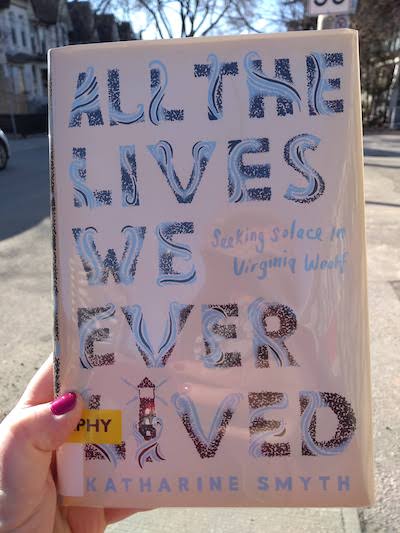
“…one of the wonders of Woolf’s novel is its seemingly endless capacity to meet you whenever you happen to be, as if, while you were off getting married and divorced, it had been quietly shifting its shape on the bookshelf” —Katharine Smyth
Lost somewhere in the flotsam and jetsam of Instagram is the post (from who? and when?) that prompted me to put Katharine Smyth’s memoir All the Lives We Ever Lived: Seeking Solace in Virginia Woolf on hold at the library. It might have been the cover that did it, a wonderful retro Hogarthian design, or maybe just the premise itself, a memoir via To the Lighthouse (and you either go in for such things or maybe you don’t—for the record, I was the target audience for Rebecca Mead’s My Life in Middlemarch Memoirs framed by reading experiences are so up my middlebrow street). To the Lighthouse is a book I’ve returned to again and again since I first read it in a university class 20 years ago—I was rereading it the summer I wrote my first novel, which is part of the reason why my protagonist ends up reading it for her book club. And the other part of the reason why To the Lighthouse turned up in my book is because of the uncanny way that it (like much of Woolf’s oeuvre) ends up seemingly connected to all things, wrapping its way around our own lives like tentacles. It is a book that one only appreciates more upon acquiring some life experience, and then some, a kaleidoscopic novel that contains multitudes: from Katharine Smyth, “To the Lighthouse tells the story of everything.”
I wonder if anyone who loves To the Lighthouse could write a memoir using the book as a framework—but they would probably not do nearly as good a job of it as Katharine Smyth has. Smyth, who studied at Oxford and took classes with Hermione Lee, who knows of what she writes, and whose prose does not read skimpily alongside Woolf’s own. Smyth is a writer with tremendous descriptive powers, a reveller of words and language—she sent me to the dictionary to look up “tenebrous.” And her own story is not a To the Lighthouse redux, but rather she tells the story of her father’s death—and also the story of her parents’ marriage, of her childhood, of her father’s alcoholism and years with cancer, of their waterfront home in Rhode Island—and it maps onto Woolf’s narrative enough to provide glimpses of illumination, just as Woolf’s own biography—her family’s home at St. Ives, the death of her mother, the devastation wrought by the Great War—illuminates her novel.
If it’s true that we tell stories in order to live, I think that we read them for the same reasons, to discover context, evidence, and meaning. After the death of her father, Smyth goes back to Woolf to better understand what happened to her family, to examine their complicated relationship, to bridge a gap between her memories of him and her life without him (ie [Time passes]). Hers would be an interesting story anyway, and she’s a wonderful writer, but it’s all the richer when regarded through Woolf’s literary lens and so is her reader’s connection to it.
March 21, 2019
Crow, by Amy Spurway
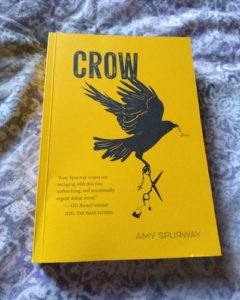
It sounds like a book you might have read before—Stacey “Crow” Fortune leaves her flashy Toronto marketing job behind when she’s diagnosed with untreatable brain tumours and flies home to Cape Breton to face her fate, returning to the chaos of her mother’s trailer and grappling with the struggles of the community she thought she’d left behind. There is death, impoverishment, addiction, and long-buried family secrets—same old sad-sack CanLit, right? But wait. Because Crow, Amy Spurway’s debut novel, is a comedy, both larger than and bursting with life. Instead of a “bucket list”, Crow has a “fuck it list,” items she just can’t with anymore, which includes suffering fools or putting up with anybody’s bullshit. She’s calling it as she sees it, even if she isn’t always seeing it right, and she’s my favourite unabashed, fierce and brilliant heroine who has both a way with language and some neurological issues since Natasha Lyonne’s Nadia in the Netflix series Russian Doll.
Part of the joys of Russian Doll was its ensemble cast, and so too it is with Crow. Crow comes home to her two best friends, Allie and Char (who has also just returned home with her baby whose father is a Congolese diamond smuggler, and who is also deaf in one ear and says most words the way she’d always heard them: “F’eyed known there was a bomb fire, ida brung some bleeding’ marchmallows.” Plus there’s Crow’s mother, Effie, a long suffering housekeeper at the Greeting Gale Inn; Effie’s gossiping sister, Peggy; her old flame and pot dealer Willy the Gimp; plus Becky Chickenshit, Shirl Short, Bonnie Bigmouth, Duke the Puke, and the Spensers, Crow’s dead father’s family who ran the mines that kept the locals in employ (and sometimes killed them) for generations.
It’s a meandering plot, but then what journey towards death isn’t? And there were moments where I wondered if Spurway was really going to be able to pull this off, a comedy novel about serious business with a cast of hilarious misfits that could come close to bordering on caricature. The most incredible material but it requires authorial deftness to do it right—but Amy Spurway is the real thing. Her glorious sentences are something to behold in, from the very first few: “I come from a long line of lunatics and criminals. Crazies on one side of the family tree, crooks on the other, although the odd crazy has a touch of crook, and vice versa. I am the weary, bitter fruit—or perhaps the last nut—of this rotten old hybrid, with its twisted roots sunk deep in dysfunctional soil.”
The adjective “brave” gets thrown around all too often in regards to literature, but I’m going to pitch it here, because it’s right for a variety of reasons. First of all, a book about death—and mental illness, and disability, and abortion, and spousal abuse, and class, and poverty—and the narrative takes no shortcuts or shies away from the hard stuff. I kept waiting for the part where it veered off course or fell into the saccharine, but that point never happened. Crow delighted me and amazed me the further I read, with its freshness, its daring, its refusal to conform (and the projectile vomiting). The bulbs that Crow finds in her mother’s trailer, and what comes up in the spring—it’s all just perfect (but no spoilers). And oh my gosh, the ending—it was literally stunning. The narrative entire is a veritable tightrope walk, a feat that’s performed with style and verve, and it’s absolutely dazzling.
“And then there’s the bigger, more grandiose questions about will happen when I’m gone,” Crow considers. “Where am I going? Anywhere? Nowhere? Somewhere? Somewhere good? Will there be tea and squares and laughing and crying and swearing there, because if there isn’t, well then I don’t want to go.” And you really can’t blame her. After 300 pages in this incredible novel, I wasn’t ready to be finished either.
February 13, 2019
Mini Reviews: Three Books on Family

The Last Romantics, by Tara Conklin: The summary on the jacket flap of Tara Conklin’s new novel The Last Romantics tells you that this is a story that begins in a yellow house, with a funeral, an iron poker…”a free and feral summer in a middle-class Connecticut town.” And while all this is true, it doesn’t begin to tell the reader what this book is about, a book that takes place over a century and actually begins in an auditorium in a dystopian future, a world wracked by climate chaos, where 102-year-old Fiona Skinner is asked to explain the story behind her most famous poem. And I’m amused by the challenge this novel must have created for marketers, who prefer novels to ones that can summed up in a sentence, and this one definitely isn’t one of those. A clue to what’s actually going on here lies in a blurb on the back by Meg Wolitzer, whose two most recent books have been similarly ambitious in their reach, not explicitly about anything either except the story itself, about the characters within and how time changes and complicates their connections. The story is the sweep, and so it is here, although it’s not always completely convincing as it is in Wolitzer’s more masterful work (though I will admit this is a high bar).
There are narrative strands in this novel that don’t go anywhere, and while one could argue that life itself is a bit like that, the reader gets the impression that this novel was once a more larger and more unruly manuscript and much got cut in the taming, and now there are several parts of the novel that don’t know what to do with themselves. There are also a few plot points that hinge on characters doing unfathomable things, which was annoying. But, most fundamentally: this novel was never not interesting, and I found it thoroughly engaging. The shifts between point of view (no small feat with a first-person narrator) was beautiful crafted, and provide moments of real illumination. The Last Romantics is a curious beast, and I can think of worse things for a novel to be.
*

Reproduction, by Ian Williams: This debut novel by award-winning poet Williams is another curious beast, but more deliberately so than with Conklin’s book. Williams brings a poet’s attention to form, always pushing at the novel’s limits, making it hold more, do more, be more—and it mostly absolutely works. Beyond form, this is always a family story like none I’ve ever read before—two people meet in a Toronto hospital room in the late 1970s and their mothers are dying. One is Felicia, a teenage girl from an unnamed Caribbean island, and the other is Edgar, adult son of a wealthy German immigrant family. One thing leads to another, and after a time they end up having a child together, though Edgar leaves the scene, and Felicia ends up raising her son, Armistice, in the basement apartment of a suburban Brampton side-split where Oliver lives, and we find them all next in the 1990s and Oliver’s two children have arrived for the summer from their home with his ex-wife, and one thing leads to another, and another child is born. Which all sounds more straightforward than it really is, because there are tricks with language, details, timelines and lineage. I loved the specificity of the story, it’s strangeness, but its utter plausibility, how it’s not a sensible story, but it makes perfect sense. This is another book that is never not interesting, but it’s also a demanding read—so when I finished Reproduction, I made a point of picking up a novel that was in a different gear. And this is my favourite thing about books, that there’s not just a single kind…
*

Her One Mistake, by Heidi Perks: The opposite of a book that’s unlike any I’ve ever read before is Her One Mistake. a psychological thriller with an unreliable narrator Gone Girlish vibeWhich certainly has been overdone in recent years, and has its pale imitators, but I thought Heidi Perks’ novel was really terrific—and reminiscent of the TV series Broadchurch, and not just because of the setting in Dorset, UK. This one starts when Charlotte agrees to take her friend Harriet’s young daughter, Alice, to a school fair, but then Alice goes missing, and Charlotte’s negligence is seemingly to blame. But as always, the real story is more complicated, and there are twists and turns to find out what really happened to Alice. My only criticism would be that Harriet’s husband is way too absolutely evil to be a realistic human character, but then a) if I’ve learned anything in recent years it’s that some men’s capacity for abusiveness is beyond my wildest imaginings and b) none of the novel’s twists hang on the possibility of his character being anything than what he is, so there’s nothing cheap happening here. I really loved this book, and its ending was gripping and explosive and had me shouting at the page.
February 5, 2019
Small Game Hunting at the Local Coward Gun Club, by Megan Gail Coles
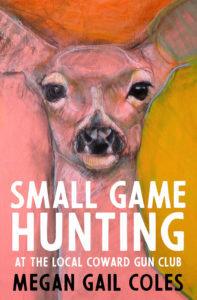
If you hang a pistol in your novel’s title, law dictates that it’s going to go off before the book is over, even if your gun is a metaphoric one. And if the title of Small Game Hunting at the Local Coward Gun Club is not indication enough that this book is not going to be completely painless, its author, Megan Gail Coles even includes a warning: “This might hurt a little. Be brave.” But yes, be brave. Venture forth into this book, where the weather is extreme and feet are freezing, and nobody is holding your hand. Where the atoms fall like snowflakes in a blizzard, instead of orderly, in a straight line, one thing after another, as you’d expect from a more linear text. There are moments when you’ll find yourself lost in the storm, zero-visibility. But just keep going. Be brave.
There are sentences in Coles’ first book, Eating Habits of the Chronically Lonesome, that I have never forgotten, more than four years after I read them first. “The reason Garry did these things was ’cause he couldn’t afford any better. Half of what he earned over at Pretty Paws was carted off to Newfoundland. Child support for an autistic kid he had with Slutty Marie down Gilbert Street, this the result of a one night stand./ Have you ever heard a sadder story, Dame? I mean, really? I barely poked her.” Not a comfort read, you know what I am saying? Unforgettable, dark, slyly humorous, meticulously crafted sentences. I have been looking forward to Megan Gail Coles’ debut novel for a long time, and while it hurt a little, it also did not disappoint.
Ostensibly, Small Game Hunting... is the story of a trendy restaurant in St. John’s over the course of a single day in February while outside a snowstorm is raging. The chef has been sleeping with the hostess who is serving his wife’s father (whose money funds the establishment) as he has lunch with the city’s mayor. The bartender is in love with the hostess. The server is hungover. And the woman who’s been waiting in the doorway, without her boots on and cold and wet and aching feet, has ties to the hostess, as they grew up together in rural Newfoundland, and to one of the restaurant’s customers, who not long ago caused her irreparable harm in an act of violence. And all of these characters have parents and sisters and ex-best friends who now hate them for justifiable reasons. “Sometimes John looks around the restaurant and wonders who is in the most trouble.”
It’s not an easy book. There is violence and there is trauma and there is an attention to language that requires the reader’s full investment, and while that investment pays off big time, the demand might also try some readers’ patience. Because Megan Gail Coles is asking a lot of her readers here, but she more than pays it back—not least of all letting plot be a huge incentive to keep on turning the pages. The tension is enormous in this web of emotions, ties and betrayals, and that proverbial gun is due to go off at any moment. The chef is fucking the hostess in the kitchen as his wife is coming down the street—you get the idea. The novel moving between each character’s point of view to add layer upon layer of meaning, and each character’s section has also its own voice, specific diction, preoccupations. It is a dizzying experience indeed to reside in so many minds at once.
But it’s also so rich, and we gain sympathy for even the most hapless characters, because nearly everyone in this book has done despicable things. And we see too the way that certain characters are imminently more forgivable than others, how they get away with everything, and by “certain characters,” I mean white men. “The defences of their choices would be vicious.”
In a recent profile, Coles described her novel as “a declaration of war on misogyny,” which is such a perfect articulation. Small Game Hunting at the Local Coward Gun Club is about the nonchalance with which men do harm to women, which is also a microcosm for an economic and political system that renders certain kinds of people disposable. Characters in the novel are robbed of opportunity, are played by institutions they trusted, are wracked by debt and addiction and systemic oppression. There’s a Gatsbyesque arc to the inevitability of their fates. And the men who cheat? Those reckless, careless characters? The bullet was never going to hit them. One way or another, they’re always going to be fine.
January 21, 2019
Bowlaway, Elizabeth McCracken
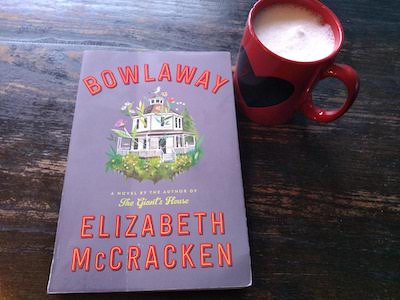
There is a house in Elizabeth McCracken’s new novel, Bowlaway, that defies all the rules of conventional architecture. It’s got eight sides and a cupola, a spiral staircase up the middle. “The walls were filled with lime and gravel and ground rice, and stuccoed with a combination of plaster and coal dust.” And in terms of narrative architecture, McCracken has similarly tossed out the rulebook for this, her sixth book and third novel. (Her two most recent books are the short story collection Thunderstruck and Other Stories, and a memoir, An Exact Replica of a Figment of My Imagination.)
The unconventional house is not actually the novel’s central edifice, however, although they’re both commanded by the same character, a woman we meet in Bowlaway’s very first sentence: “They found a body in the Salford Cemetary, but aboveground and alive.” This is Bertha Truitt, of the gapped teeth and enormous bosom, who claims to be the inventor of candlepin bowling and is utterly uninterested in delineating the story of where she came from. (For the most part, so is Bowlaway itself.) Like everything McCracken writes—sentences, paragraphs, characters, action scenes—Bertha Truitt is vivid. The heart and soul of the book, one would think, or at least its foundation or supporting beam, if we’re back to architecture. But forget the rules, remember? Because Bertha Truitt is deceased by page 78 (and no, this is not “a spoiler.” Bowlaway is a book that could not be possibly be spoiled), swept away to her death in the Great Molasses Flood, Boston, 1919.
I will admit that at first I was unsure of my footing as a reader in this narrative, because it really is one in which the bottom can fall out at any time. Because I’d arrived at Bowlaway with fixed ideas about the way a narrative should go, ie the protagonist should not necessarily drown in molasses on page 78. Because this novel isn’t easy, and it’s full of tricks and play, and ghosts, and babies who die before they’re born, and sons who are actually ex-husbands. It’s not an simple read, and the reader has to pay attention, but the rewards of that attention are considerable, immense. Her previous novel, Niagara Falls All Over Again, which I loved, was about two vaudeville performers, and Bowlaway is similarly larger than life (McCracken is also author of a novel called The Giant’s House), a spectacle.
But instead of a stage, the setting is a bowling alley, Bertha Truitt’s candlepin alley, Truitt’s, later named Bowlaway two generations following (although the family tree is complicated). Scene of one spontaneous combustion, as well as a murder, and home to a ghost, McCracken follows the alley and its regulars through three-quarters of the twentieth century in a novel that is unlike any other book you’ve read before, as rare as an eight-sided house inhabited by extinct avian species. With sentences and imagery that are shocking in their freshness and perfection—the mother who gives out love in homeopathic doses, say. There is no other writer who writes like Elizabeth McCracken, and I’ve never read a book quite like Bowlaway.
January 14, 2019
Ghost Wall, by Sarah Moss
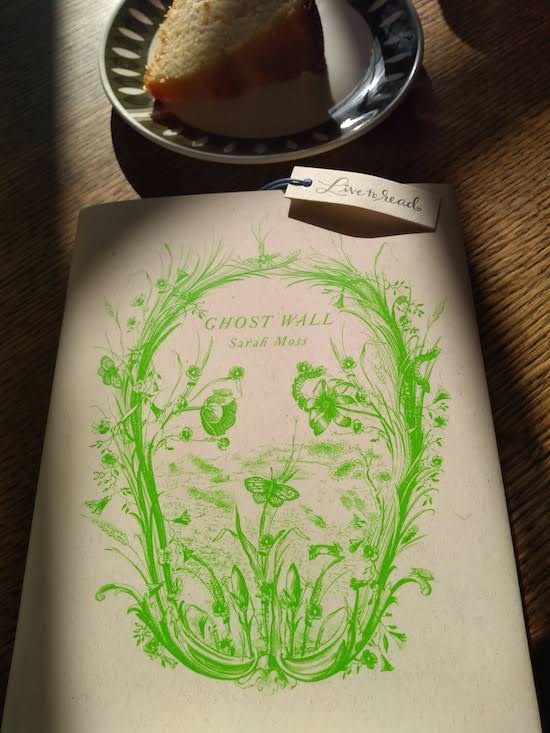
I’ve been avoiding bookshops lately (except for a trip to Type Books’ new location in The Junction in December!) with a focus on reducing the overwhelming number of books on my to-be-read shelf. Which I’ve been pretty successful at with a huge tower of reading completed over the holidays, and also a clear-out of more than a few books that I decided to finally accept that I would never read. And when I finished reading Did You Ever Have a Family, by Bill Clegg, on Saturday morning (acquired from a Little Free Library; has been sitting on my shelf for months; is so incredible but also very sad) and we had no further plans for the day, I decided that what I really, really needed was a bookshop venture, and my family was kind enough to accompany me, obviously with the promise of snacks.
And what a wonderful thing, for me at least, although probably not my family, to arrive at the bookshop without an idea of what I was looking for. Something more uplifting than Did You Ever Have a Family, was my premise, though I wasn’t exactly successful on that front, but then a book need not be uplifting when it is brilliant, original and completely affecting. The book was Sarah Moss’s new novel, Ghost Wall, which only just came out (super exciting—I tend to be either six months or decades behind on all the newest things) and I’d read the review in the Toronto Star that morning. Beginning my Sarah Moss discovery, which I’ve been longing to embark upon on reading Rohan Maitzen’s reviews of her other books, which sound as intriguing as they are wide-ranging.
It’s a slim little novel whose design (in Canada, at least) is delicate and exquisite, a book made up of all kinds of competing tensions. Silvie is a teenager from Northern England whose bus driver father is an Iron Age enthusiast in his spare time, and she’s been raised on his rambles and fascinations of ancient Britons, and therefore knows how to forage for bilberries, which makes her an object of fascination for the university students her family is spending her dad’s annual leave with on their experiential archeology course. The professor and Silvie’s dad couple their skills and knowledge, leaving Silvie with the students, just a few years older than she is, worldly in a way she’s never been able to fathom. Her time with them is a brief reprieve from her father’s rigid control, but then she’s defensive around them, knowing they’re judging her parents’ accents and background. She also knows that aligning them too much will provoke her father’s wrath, whose force and dangerousness gradually becomes more apparent as the narrative progresses and underlines the novel’s idyllic setting and celebration of the natural world with something much more sinister.
Unabashedly feminist, Ghost Wall dares to question what people are really reaching for when they’re yearning for a simpler time, for an authentic kind of culture, or whiteness, or Britishness. Just what is fundamental about who we are and where we come from, and who gets to be in charge of that? It’s sharp, fast-paced, and disturbing, an exercise in minimalism and subtly. I loved it.
December 3, 2018
Dear Evelyn, by Kathy Page
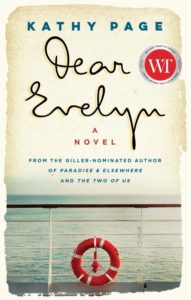 Dear Evelyn, by Kathy Page, is a novel so good that last night I was full of nostalgia because it had been a whole week since I was reading it. And I was reading a very good novel last night too, but still, I was sorry to have been a whole seven days away from the remarkable experience of having been absorbed in Page’s award-winning book, which I read in two two-hour sittings. It’s the story of a marriage, the story loosely inspired by letters between Page’s own parents, some of which actually appear in the novel, making authorship an interesting collaborative endeavour. Beginning with the birth of Harry Miles, who grows up between the wars in London, the reader aware of the inevitability of his trajectory toward battle himself. But first, Harry meets Evelyn on the steps of the Battersea Library, and they fall in love with the same urgency as the world’s preparation for war, another kind of unreality. They spent most of the first years of their marriage apart, as Harry takes part in training and departs for war in North Africa. Seemingly-pivotal scenes—their wedding, Evelyn’s first pregnancy, the birth of their daughter—take place outside the narrative while Page focusses on the quotidian instead, the ordinary dailiness that Harry so longs for when he is away at war and longing for his wife.
Dear Evelyn, by Kathy Page, is a novel so good that last night I was full of nostalgia because it had been a whole week since I was reading it. And I was reading a very good novel last night too, but still, I was sorry to have been a whole seven days away from the remarkable experience of having been absorbed in Page’s award-winning book, which I read in two two-hour sittings. It’s the story of a marriage, the story loosely inspired by letters between Page’s own parents, some of which actually appear in the novel, making authorship an interesting collaborative endeavour. Beginning with the birth of Harry Miles, who grows up between the wars in London, the reader aware of the inevitability of his trajectory toward battle himself. But first, Harry meets Evelyn on the steps of the Battersea Library, and they fall in love with the same urgency as the world’s preparation for war, another kind of unreality. They spent most of the first years of their marriage apart, as Harry takes part in training and departs for war in North Africa. Seemingly-pivotal scenes—their wedding, Evelyn’s first pregnancy, the birth of their daughter—take place outside the narrative while Page focusses on the quotidian instead, the ordinary dailiness that Harry so longs for when he is away at war and longing for his wife.
And long for her he does, resisting temptation from other women when he’s far from home, and when he returns and settles into civilian life, the attraction between them is still strong. It’s not that this is a love poorly thought out, marry in haste, etc, but rather that life is long and love is complicated. And what is so astounding about the novel is how Page manages to show that complicatedness without compromising either of her characters. She shows how love and marriage can turn into something else as husband and wife continue to become more and more themselves as they age. It’s not that Evelyn changes—it’s that she never does. That strong personality that Harry continues to admire in his wife for so many years becomes a force that eventually pushes him out of his home, and the force is devastating—and yet he still continues to love her. And Evelyn herself, who is indeed herself but to a fault, and how her character traits borne out of struggle and deprivation during her childhood eventually leave her utterly alone. No wrenches need be thrown into this plot line, is what I mean. Or maybe what I mean is that that’s just what life is, a wrench. And characters themselves are just along for the ride, for better or for worse.
Dear Evelyn has a wonderful, effortless sweep, moving its characters from their hearty youth on to their nineties, including just the right details to show how the world is changing around them. Here, the novel benefits from Page’s experience as a short story writer, which is reflected in the novel’s episodic structure, the ease with which it moves from scene-to-scene and accumulates story without becoming bogged down. Short story writers are expert at efficiently fitting big ideas into small packages, which is how—in just 300 pages—Page is able to contain a century; two wars; two fully realized, flawed and complicated people; a rich and tumultuous marriage; so much love; and the pride, rage and resentment that keeps so much from ever being properly expressed.
November 28, 2018
A Spark of Light, by Jodi Picoult
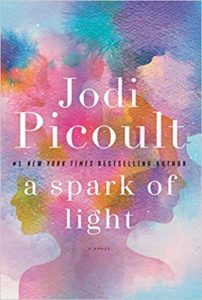 “Oh my gosh, does Jodi Picoult ever know how to write a novel,” I said to my husband the other night on the tail end of having read her latest in a single day. But of course she does, having written twenty-three of them, and has a reputation for bestsellerdom as well as a penchant for melodrama. I’d started one of her novels years ago—I think it was Nineteen Minutes, about a school shooting, and decided it wasn’t for me, and I actually hadn’t given Jodi Picoult a lot of consideration since…until A Spark of Light, set against a hostage taking at a Mississippi abortion clinic. And we all know there is nothing I’m more interested in than a good pop-culture abortion narrative, so I put this book on hold at the library, and it turns out that now I know what everybody else knows, which is Jodi Picoult is really extraordinary.
“Oh my gosh, does Jodi Picoult ever know how to write a novel,” I said to my husband the other night on the tail end of having read her latest in a single day. But of course she does, having written twenty-three of them, and has a reputation for bestsellerdom as well as a penchant for melodrama. I’d started one of her novels years ago—I think it was Nineteen Minutes, about a school shooting, and decided it wasn’t for me, and I actually hadn’t given Jodi Picoult a lot of consideration since…until A Spark of Light, set against a hostage taking at a Mississippi abortion clinic. And we all know there is nothing I’m more interested in than a good pop-culture abortion narrative, so I put this book on hold at the library, and it turns out that now I know what everybody else knows, which is Jodi Picoult is really extraordinary.
Obviously, her narrative being constructed around a hostage stand0ff, Picoult’s melodramatic bent continues, and I was wary of her reputation “for writing about both sides of polarizing issues.” Frankly, we’ve got far too much of “both sides-dom” going on in our discourse at the moment, which results in justifications for fascists being given wide-platforms, sympathy for white nationalists, and slow, terrifying and far from grass-roots growth of the anti-abortion movement in Canada. Now is hardly the time to stand on the middle, to sit on the fence, etc, instead at this dangerous political moment it’s more important to take a stand than ever, to draw a line.
The thing is, of course, that abortion isn’t actually polarizing after all, and the only people who might suppose it is are the people who’ve only ever considered abortion in the abstract or as a thought-exercise. But for those of us with lived experience of abortion and those who perform abortions as part of their medical practice, abortion is very much a space in between, where women who have abortions tend to be mothers already, where almost all abortions after 12 weeks are for very much wanted pregnancies whose severe and unviable fetal abnormalities, where women who miscarry and have abortions are sometimes the same women, where women who have abortions go on to have the families they wanted when they’re ready for it—and where “pro-life” women can find themselves on the other side of the debate when they’re faced with complicated or unwanted pregnancies. As Picoult writes in her novel’s Author’s Note: “Laws are black and white, The lives of women are a thousand shades of grey.”
And she shows so many of those shades in A Spark of Light, which begins with a paragraph on how Mississippi abortion clinics had had so many restrictions placed upon them (“the halls had to be wide enough to accommodate two passing gurneys; any clinic where that wasn’t the case had to shut down or spend thousands of dollars on reconstruction…”) so that those remained were rare as unicorns. On the periphery of the novel is a young girl who was unable to obtain an abortion due to age restrictions and other legal hoops to jump through so that she ended up administering a pill ordered from the internet, and when she’s brought to the hospital after bleeding profusely, police are called and she’s arrested for murder. The pregnant women in the clinic when the gunman breaks in are from all kinds of different backgrounds and in various situations, and some of them aren’t pregnant, because abortion is only one kind of health care administered by women’s health clinics. And what I loved most about the novel is that even the characters who aren’t pregnant or haven’t had abortions have had their lives touched issues of reproductive justice—sometimes without even knowing it, which is often the case in a society where things like rape, women’s sexuality and abortion are taboo.
The novel was gripping, and here is where I saw Jodi Picoult’s plotting prowess in action—the twists kept coming right to the end. And the novel is set in reverse chronological order, even, which makes the twists at the end all the most astounding from a craft standpoint, and none of them were cheap either—I really appreciated that. The characters were rich and fully developed, and this is where the novel was wonderfully challenging to me, in how Picoult humanizes a character who’s actually a pro-life protestor gone undercover to record illegal practices inside the clinic (she doesn’t find any, btw) when the gunman arrives. It turns out not to be about “both sides,” but instead understanding one’s humanity and motivations, in making characters real and multi-faceted, and learning where someone is coming from. Which doesn’t mean they’re right, and Jodi Picoult shows that they’re definitely not (fact: the best way to limit abortion is to have liberal abortion laws, access to birth control and sexual education. fact: making abortion illegal drives abortion underground and puts women at risk. fact: there has been abortion everywhere and always. fact: opposition to abortion is fundamentally an opposition to women’s sexuality). It remains ever important for us to listen to and learn from each other.
This is the kind of novel that can change the world, because if it challenged my ideas about abortion, it will also challenge the mindset of someone whose ideas are different, to consider other points of view. To bridge a divide that grows ever wider as we all sit convinced of our righteousness, without considering that someone on the other side feels just as righteous as we do. (Picoult doesn’t include male pro-life activists in the novel, who are the more typical demographic actually. I suspect that she knows that their motivations and backstories are less interesting than their women counterparts, that they have less to teach us in this situation.) It’s also just a thoroughly terrific read with great characters and plotting, and facts and current events while not being too heavy on the research, and really good writing, apart from one unfortunate paragraph where a father makes a twist on that “one’s child being your heart outside your body” idea to talk about a child being like a soap bubble you carry on your palm while you run through an obstacle course, or something like that. But let us forgive the novel that has just one terrible simile, especially if it does all the other incredible things. After twenty-three novels, Jodi Picoult knows what she’s doing.
November 27, 2018
Motherish, by Laura Rock Gaughan
 True confession: I find debut short story collections to be a bit hit and miss, more miss than hit, actually, but Laura Rock Gaughan’s Motherish turns out to be one hit after another. The entire book cohering around ideas of being a mother and having a mother, and smart enough to know that within this “niche” are a million degrees of experience. Every story is distinct, sparkling in its own particular way. It begins with “Good-Enough Mothers,” about a woman whose wife travels for work while she stays at home with their children and ponders the neighbourhood, including the family across the road who run a tow-truck company, and the woman next door who lives with her ailing adult daughter, and the strange and disturbing ways that these households’ connect with each other. Notions of bad mothers and good mothers intermingle here, and everything is relational. This story’s tone is ominous, dark-undercurrents. In motherhood always, there will be peril, and you’ll have to read to find out where.
True confession: I find debut short story collections to be a bit hit and miss, more miss than hit, actually, but Laura Rock Gaughan’s Motherish turns out to be one hit after another. The entire book cohering around ideas of being a mother and having a mother, and smart enough to know that within this “niche” are a million degrees of experience. Every story is distinct, sparkling in its own particular way. It begins with “Good-Enough Mothers,” about a woman whose wife travels for work while she stays at home with their children and ponders the neighbourhood, including the family across the road who run a tow-truck company, and the woman next door who lives with her ailing adult daughter, and the strange and disturbing ways that these households’ connect with each other. Notions of bad mothers and good mothers intermingle here, and everything is relational. This story’s tone is ominous, dark-undercurrents. In motherhood always, there will be peril, and you’ll have to read to find out where.
“Maquila Bird” takes place in Mexico where a woman who works in a garment factory sewing jackets aims to escape her employers’ mandatory pregnancy test and hold onto her job just a little bit longer. In “Transit,” a pregnant woman who is uncertain of the terrain that lies before partakes in an eventful streetcar journey. “Let Heaven Rejoice” is the story of an oblivious church organist and the thoughts of those around her while the music plays, including her husband and children. “At the Track” takes place during the summer of 1975 (“The summer of 1975, my grandfather’s friends wore leisure suits in turquoise and moss and mulberry with patterned shirts left open a few buttons to reveal an overgrowth of chest hair…”) when a young girl is left in the car of her not-always-responsible grandparents while her single mother works nightshifts. In “The Winnings,” a woman’s fiancé wins the lottery and she starts to reconsider their future together. “Me and Robin” is narrated by a young girl who cares for her effeminate younger brother, although her feelings toward him are ambivalent.
“Masters Swim” is a strange but compelling story about swimming, and sisterhood. In “The New Kitten,” a woman’s job as a bank teller gives her a unique perspective on her husband’s infidelities as she tracks his accounts. “Leaping Clear” is about a woman nearing the end of her life who is visited by the ghost of the man who’d got her “in trouble” years before, and reveals the real story of what happened to him after he skipped town (and what happened to her when she said yes to another man who wanted to marry her anyway). “Woman Cubed” about a contortionist and her overbearing partner. “Mother Makeover” about reality TV show when mother drama gets ramped up to max. And finally, “A Flock of Chickens,” which I loved, about a teacher who gets into an ill-advised relationship with a colleague and ends up in a chicken coop, as you do.
Which is all the stories in the book, actually, which means not a dud among them, and I enjoyed reading this collection so much, its tautness, its polish, and wise perspective on characters’ lives. Stories that are never samey, but instead such a pleasure to behold, one after anther.
November 22, 2018
Margaret Laurence and Jack McClelland: Letters
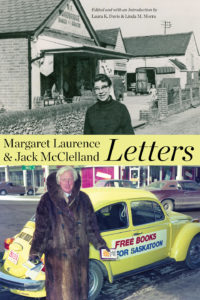 It’s not typically a ringing endorsement when I tell you in November about the book that I’ve been reading since June, but this is no ordinary book. Margaret Laurence & Jack McClelland: Letters, edited by Laura K. Davis and Linda M. Morra has been one of the highlights of my literary 2018, a mainstay on my bedside which I’d pick up and read a couple of pages from every night. It begins with a letter from Canadian Publisher J.G. McClelland who sends a letter to a “Mrs. Laurence” in 1959 upon learning from a mutual friend that she’d recently completed a novel whose description sounded like something he’d be interested in. “I would be delighted if you would let us have the opportunity to consider the manuscript,” he writes.
It’s not typically a ringing endorsement when I tell you in November about the book that I’ve been reading since June, but this is no ordinary book. Margaret Laurence & Jack McClelland: Letters, edited by Laura K. Davis and Linda M. Morra has been one of the highlights of my literary 2018, a mainstay on my bedside which I’d pick up and read a couple of pages from every night. It begins with a letter from Canadian Publisher J.G. McClelland who sends a letter to a “Mrs. Laurence” in 1959 upon learning from a mutual friend that she’d recently completed a novel whose description sounded like something he’d be interested in. “I would be delighted if you would let us have the opportunity to consider the manuscript,” he writes.
Three weeks later, Margaret Laurence sends her reply. along with her manuscript for This Side Jordan, and so a literary partnership was born, between one of Canada’s greatest writers and McClelland, of McClelland and Stewart, the iconic Canadian publisher. And what a thing to watch, to read—the camaraderie developing between them, Laurence finding her voice as a writer, McClelland’s nurturing of and respect for her talent, which continues through the book entire. By November 1960, they’ve dropped formalities and are “Jack” and “Margaret,” and they spar, and they gossip, and they worry for each other, and support each other, and their letters tell a great of the story of Canadian literature and publishing in the second half of the 20th century (which seems just as perilous and depressing as it is in the 21st, fuelled by passion and no cash. “The market for fiction is so bad,” McClelland writes Laurence in 1964).
She writes to him in 1965, “I have finally managed to get a novel finished, but do not know yet if it’s any good or not.” That novel was A Jest of God, which McClelland finally reads and responds to by telling her, “The thing that continues to amaze me about your writing, Margaret, is that you improve with everything you write.” I adored so many parts of this book in the specific, like when Laurence coerces McClelland into creating an LP to release alongside The Diviners, which was so not his jam and much more trouble than it was probably worth. Or when McClelland is speaking to a group of English teachers and railing against Alistair MacLean (“one of the worst writers in the world”—what a distinction!) and the teaching of his works in Canadian high school classes, and then one of the teachers responds with “here you have been complaining about the censorship of The Diviners and, at the same time, you are attempting to censor Alistair MacLean.” McClelland closes the anecdote with this: “It’s a crazy fucking world.”
I also really loved the story of Margaret Laurence’s trip to the Writers Development Trust fundraising dinner in 1982, mostly because I often find being an author in public is often an exercise in various humiliations (see my friend Rebecca Rosenblum’s recent post “Indignities”). There were various complications at this particular dinner, particularly involving Margaret Laurence having to wait for a long time in a stifling corridor with nowhere to sit down or get a drink, and then when she finally enters the event and arrives at her table, she discovers that her table is…empty. The businessman who bought her table is late, and then when he finally shows up, he spends 20 minutes talking to Pierre Berton, and he also neglected to invite anyone else to sit at their table. It’s agonizing, and hilarious, and so many of us have been there.
By 1986, however, the dust has settled enough that McClelland dares to invite Laurence to another fundraising dinner for the Writers Development Trust, but this time the party is in her honour, and he’ll even host it in Peterborough so she won’t have to travel, and she’s even in agreement. But in September of that year, he receives the news that Laurence has terminal cancer, and he writes to her immediately: “Funnily enough what catches me at this particular moment is that I wish to God I could write. I would like to write you such a superb letter that it would enchant your and enrich you and support you through whatever the months ahead have to impose on you. I just don’t have that gift [or] skill—the one in the world that I admire more than any other.”
Laurence would die the following January, and I must say I have some vague idea of how hard that must have hit McClelland, how much he must have missed her, because I could have read this book forever. And possibly I will.





